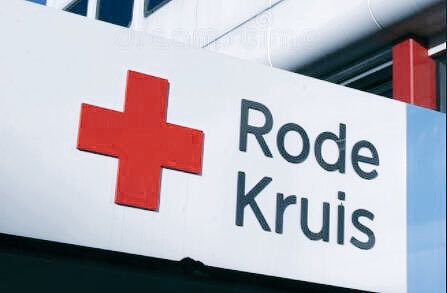EXPOSÉ: HOW THE NETHERLANDS RED CROSS FAILED THE JEWS
by Dr. Manfred Gerstenfeld
First ever interview in English with Holocaust researcher Regina Grüter, formerly of the Netherlands Red Cross, is a damning critique of the NRC and the Dutch government-in- exile in London.
To begin, Dr Gerstenfeld writes:“In 2012, the Board of the Netherlands Red Cross (NRC) asked me to investigate the role of their organization shortly before, during and shortly after the occupation. I undertook this assignment as a researcher of the NIOD Institute for War, Holocaust and Genocide Studies in Amsterdam. My findings are contained in my book whose title translates as Matters of Life and Death; The Netherlands Red Cross in the Second World War "

Regina Grüter was born in 1953 in Bulli, Australia. She studied modern history at Leyden University. For her PhD she received the Dr. L. de Jong award. From 2003 until 2012 she held a senior position at the NRC. In 2010, she was an expert witness in the trial against war criminal Ivan Demjanjuk. Since 2013 Grüter has been a senior researcher at the NIOD.
Regina Gruter writes:
"After the war the NRC board was highly criticized for doing little to nothing for two groups of citizens that needed their help most: persecuted Jews and political prisoners who had been sent to German camps.
"The war time board was replaced after the liberation and the new board appointed a commission to investigate the functioning of its predecessor during the war and the post-war repatriation. The commission's conclusions were harsh: the NRC board had failed. It had been formalistic without showing imagination or courage to find ways to help Jews and political prisoners. That was even more true for the Dutch government-in-exile and the London Committee of the NRC, which had been founded in May 1940 by Dutchmen in the British capital.
"My research confirmed these conclusions. It nuanced some of them and also added new information. One of the first anti-Jewish measures of the German occupier which affected the NRC board concerned its Blood Transfusion Service. Jewish donors were no longer allowed to donate blood to non-Jews. The NRC eliminated Jews from its donor lists.
"To execute this measure, the NRC called upon the Inspectorate of the Citizens’ Registry which had a registration of the Jewish population. One official resigned in protest. In 1941, due to another Nazi regulation, the NRC board asked Jewish members and volunteers to resign their membership.
"In 1941 more than 400 Jewish men were arrested in Amsterdam and sent to the Buchenwald concentration camp. The NRC wanted to offer them help and approached the German authorities, who refused to give permission. Upon the initiative of its Amsterdam branch, the NRC asked the Germans to free two NRC volunteers who had been arrested, but the Germans hinted that the NRC should not take Jew-friendly positions.
“In 1942 an NRC committee was set up to send food and medicines to the camp in Vught. It tried in vain to get permission to send parcels to Jews interned in the Dutch transit camps, Vught and Westerbork.
"The general attitude of the NRC board was to accept the German measures against the Jews and the prohibitions against helping them. The board feared contradicting the Germans in case its permitted tasks such as sending parcels to Dutch POW’s would be curtailed.
”The highest Dutch officials under the German authorities tended to accommodate themselves to the circumstances. They acted as intermediaries between the NRC and the occupiers. The NRC board had a similar attitude. It consisted mainly of conservative noblemen and high retired military. Yet, those who wished to could and many local NRC officials and volunteers gave humanitarian aid to the population and to internees in Dutch camps.
"I found some examples of members in NRC branch offices who helped Jews. In Switzerland there was an official of the NRC London Committee, Carel Flugi van Aspermont, about whose activities very little was previously known. He undertook many efforts to send parcels to political prisoners and deported Jews. He joined efforts with Dutch Jewish refugee, Max Gans, who founded the Jewish Coordination Commission in Switzerland.
"They succeeded in sending 1,853 parcels to Bergen-Belsen and 1,122 to Theresienstadt with the assistance of the International Committee of the Red Cross. How many parcels reached the camps is not known. Flugi and Gans obtained little support from London, partly due to the Allied food and currency blockade. Moreover, the London Committee and the Dutch government-in-exile did not consider humanitarian relief for deported Jews and political prisoners a priority. Compared to the indifference of the NRC and the Dutch parties in London, the endeavors of the two activists in Switzerland demonstrate the contrast between formalists and true humanitarians.
"The performance of the Dutch government and the NRC in repatriating Dutch citizens was poor. The NRC was given a minor role, but was active in the reception of repatriated survivors. Generally speaking, the reception was cool. The Dutch government had decided that no difference should be made between non-Jewish and Jewish repatriates, even though the latter had special needs. The German authorities had deprived them of everything. Yet the Jews did not receive special assistance even if they had virtually nothing left – no housing, no work - and their social network had been destroyed.
"The Information Bureau of the NRC had as task investigating what had happened to those who 'did not return.' It sent cold formal statements to surviving next of kin. The NRC office saw no need for special support for the surviving Jews. In this, it again failed in its humanitarian mission.”

Grüter concludes: "Due to my findings the current NRC board has apologized for the behavior of its war time predecessor to the Jewish communities in the Netherlands and Israel."